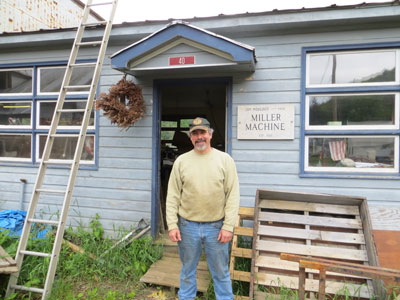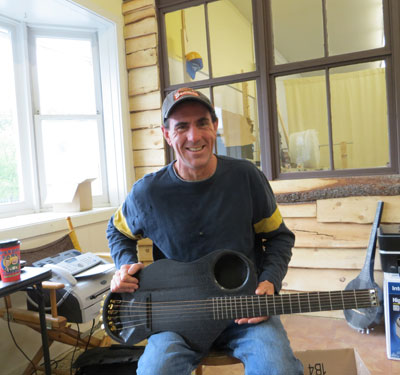Digital tools can create an important advantage in running a business these days, and we’re working in Bethel on a number of projects to help make these tools more reachable, including installing a free downtown Wi-Fi zone. But older means of communication, such as word of mouth and a tightly knit community are also great advantages. Justin McCoart, our Wi-Fi zone technician (and owner of Up and Running Computer Services), is from Bethel, and managed to connect two very different companies in his town to potentially work together for mutual benefit.
Alpaca Guitar is a new company that makes portable and durable travel guitars, and raised almost $70,000 on the online fundraising site called Kickstarter to buy a new CAD/CAM machine and begin producing guitars in bulk. The company finished its Kickstarter in March, and has recently opened up its workshop in downtown Bethel.
The Miller Machine Company opened its doors in Bethel in 1937. In 1967, the shop’s owner, Mr. Miller, created a machine that built a plastic part for a small company. The machine was successful, and so was the company. When Mr. Miller started producing these machines, Polaroid couldn’t afford to pay for the machining up front, but offered stock options instead. “The old man retired a millionaire,” said the now owner, Jon Hodgdon.

Jon Hogdgon, owner of Miller Machine Company,
outside of his workshop
Hodgdon has lived in Bethel pretty much his whole life so far, except for when he went to New Hampshire for college. He started working for Miller Machine Company in 1983, although he had visited the place since he was eight years old “when I was here, getting my mini-bike fixed,” he said. He bought the business in 1994, two years after Mr. Miller passed away, and had been ramping up successfully until 2011.
That was Hodgdon’s second-best year since he began running the company in 1992. The only reason it wasn’t his best year was that he only worked for eight months. He was working towards a big contract, and had paid off a new, four-axis Swiss screw machine to improve his speed and bring his machining skills into the 21st century. He had his paperwork and machines in order, and was ready to start producing even more. “I was getting ready to double my business,” said Hodgdon.
Then came Irene. The Miller Machine shop is located in the flood plain of the White River, and when the floods hit, they filled its basement to the ceiling with mud and water, and filled the top floor, along with all the machines that were there, with several feet of mud. “It took 150 man hours, just shoveling mud off of this floor,” said Hodgdon, “and 420 man hours in the basement.” Most of Hodgdon’s machines were destroyed, including his newly purchased backups, which were in a storage container outside his machine shop.
When McCoart heard from the owner of Alpaca Guitar that he was looking for a new metal guitar tuner piece, he knew he had to put Alpaca in touch with Miller. Sometimes, a new business and an old business can help each other by working together.
Chris Duncan, the man behind Alpaca Guitar, is originally from Oregon, but most recently from Georgia, where he ran a security company for eleven years. Just over two years ago he decided to take his wife and their three boys on a thirteen month road trip in a converted Greyhound bus. They were partially through their trip when Duncan heard about the Irene flooding from his aunt who lives in Barnard, so he hightailed it up to Vermont to help out.
He ended up staying in Vermont with his family for over a month and a half, helping in the aftermath of Irene with the cleanup effort that followed. “I met a lot of nice people here,” said Duncan, “but I still had a lot of traveling to do, so we all came back when we were done.” After several more months of traveling, Duncan and his family returned to Vermont to settle in Barnard. They had fallen for the kindness of Vermont’s people and the sense of community they felt while helping out after Irene.
The timing couldn’t have been better for Hodgdon.
In the aftermath of Irene, Hodgdon’s biggest customer, who was responsible for over half of his business, walked away. Hodgdon is now working at about one third of the level that he used to work. He works at the local supermarket on nights and weekends to pay the bills, but he’s trying to use what he has left in his shop to get his business going again. When it comes to the machine shop, “I haven’t had a paycheck since the flood,” he said, “I had more money in my pocket when I was 16.”
Still, the customers he has now are growing, and there’s a reason Hodgdon was so successful before Irene. “What I have always excelled at is taking a project and figuring out how to do it quicker, simpler, better,” said Hodgdon.
Now, he’s set to grow alongside a small but growing business. He’s got a few good customers, such as LED dynamics in Randolph, but he’s always on the lookout for another. That’s where Alpaca Guitar comes in.

Chris Duncan, owner of Alpaca Guitar,
shows off one of his travel guitars
“My business philosophy is to build it in an unconventional manner,” said Duncan. The fabric Duncan uses for the structural support of his guitars is made from flax, “but once hemp fiber is available in Vermont,” said Duncan, “I’ll switch to that.” The resin Duncan uses to coat his guitars is 80% bio-derived, and 20% from petroleum products, “as opposed to regular resin, which is usually the other way around,” said Duncan. In fact, Duncan is aiming for a product that “is built by our neighbors in the cleanest manner available to us.”
“It’ll still kill you if you drink it, but it’s as good as we can get,” he assures.
He’s hoping to keep his workers local, too. Currently, aside from his two partners, Matt Bogosian and Andrew White, Duncan has hired one worker, Paul, as a luthier, who commutes five miles from South Royalton. “We’ve turned down some people who wanted to come in from Hanover [NH],” said Duncan, because the carbon footprint for their commute was too large. “We wanted to be hiring within five miles or so of here.”
Hodgdon and the Miller Machine Company are just across the brand new bridge in Bethel. Duncan can walk to it from his new workshop.
“He’s got good ideas,” said Duncan, “but he’s new to the instrument world.”
Hodgdon, on the other hand, has his own misgivings. “He’s a musician, he’s not a manufacturing engineer,” he said, “I’m used to specifics, not ideas.”
The two are working together to understand each other’s business strategies.
When Hodgdon talks about the speed at which Duncan wants to move his production, he shakes his head. “I’m excited about the Alpaca work, if I can ramp up quickly enough,” he said, and he is hopeful. Alpaca wants to produce five guitars a day. That’s 60 tuning pegs a day to start, and that’s enough, along with the business he already has, to keep Hodgdon busy. Hodgdon is hoping that Alpaca Guitar might be his Polaroid. Duncan will do what he can to make that a reality.
“It’s taken a year or more, involving lots of thoughts, testing, learning, and talking to people,” said Duncan, to get to where Alpaca Guitar is now, poised to start producing five guitars a day and to open a retail shop. His finished product is about to ramp up, and he’s hoping to bring back some of the economic resilience he knows the US needs, right into the heart of a town that was hit hard by the floods.
“Some things make sense to some people,” said Duncan, “This makes sense to me.”
